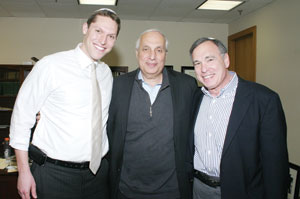Local Jews put face on Israel’s fight against terror
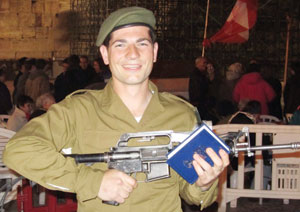 Israel needs us
Israel needs us
That’s one of the many rallying cries you will hear if you talk to members of the Kansas City Jewish community. You’ll hear it in conversations at community events, in shul and read all about it on Facebook and Twitter.
So many people have personal ties to the Jewish State, family and friends who are working, studying, visiting or living there.
“Worrying about family and friends in Israel. Hope all are safe,” posted Ellen Portnoy to her Facebook page on Sunday. Dozens of other local Jews could have, and many did, write or say the same exact thing since the violence began escalating more than a week ago.
Several young members of the community are currently serving in the IDF including Jason Barnett, Sam Mendel, Sam Kahn, Tomer Bar-Lavi and Aviv Bonomo. Rachel Kaplan, Alana Gaffen and Mai Bonomo are in a program preparing to enlist in the IDF. The Chronicle also knows of several young students studying in Israel at this time including Samantha Mayse, Joey Horak, Gili Kamara and Abby Nottberg.
Rabbi Arthur Nemitoff of The Temple, Congregation B’nai Jehudah, whose daughter Elana is attending rabbinical school in Israel along with Rachael Klein, was one of the first local rabbis to send an email to his congregants last week explaining the current situation.
“The loss of life — of any civilian life — is tragic and we mourn the deaths of all innocents who have died so far, whether in Israel or in Gaza,” he noted.
In his email he suggested, as many other local rabbis have also done, that one thing we can do locally is pray.
“Pray for the safety and peace of Jerusalem, Israel and the entire region,” he told B’nai Jehudah members.
Those who want to help, he continued, should “donate what you can to help victims of terror in Israel.” Many national organizations have established funds to raise money for the people of Israel. Locally, the Jewish Federation of Greater Kansas City has started a fund.
The stress of rocket fire
A New York Times editorial published Wednesday, Nov. 14, stated, “No country should have to endure the rocket attacks that Israel has endured from militants in Gaza.” As Ophir Hacohen, the Israeli emissary to the Jewish Federation points out, people who live in southern Israel have been enduring this for 12 years.
Hacohen, who hails from Tel Aviv and served as an education and culture officer on the northern Gaza border in 2009, said it’s very difficult to imagine what it’s like to be hit by rockets for the past 12 years. She helps explain it using this analogy:
“Imagine your next door neighbor throwing stones at your house. Every day, every week. He has been throwing stones at your house all through the day and night. You have to think twice before leaving the house or staying in a certain room, for the fear that the stone will come through your window when you least expect it.
“What would you do? Would you just let him keep throwing those stones, when he puts your family at risk? Probably not, right?
“Now, consider this: Rockets have been fired from Gaza into Israel for 12 years now. 12 years. There are kids who will soon celebrate their Bar Mitzvah, and have spent every day of their lives on edge, wondering when they will hear ‘Color Red’ (code for rocket falling) and have 20 seconds (or less) to find cover. They don’t even know whether or not they will even get to celebrate their Bar Mitzvah with their families, since gatherings of more than 100 people have been banned in certain areas around the Gaza strip for fear of mass casualties and injuries,” Hacohen said.
It is hard and stressful for Hacohen, who joined the Jewish Federation staff in September, not being in Israel right now.
“I would have probably been called up for reserve duty. Sometimes it feels that you need to be part of the struggle, because that is what makes you Israeli. However, despite the difficulty, I feel my job here is very important, that I have a lot of influence here and that I’m serving Israel in a worthy and much needed way nonetheless,” she said.
The Conflict’s human side
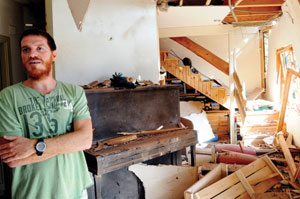 One of the first casualties of the latest escalation of violence happened on Thursday, Nov. 15, when three members of the Chabad community were “brutally killed” by a Hamas missile. Rabbi Zalman Tiechtel of KU Chabad, said the young woman, who was pregnant, worked in a Chabad organization in India and was visiting her hometown in Israel for the memorial service of the 2008 Chabad Mumbai terror victims.
One of the first casualties of the latest escalation of violence happened on Thursday, Nov. 15, when three members of the Chabad community were “brutally killed” by a Hamas missile. Rabbi Zalman Tiechtel of KU Chabad, said the young woman, who was pregnant, worked in a Chabad organization in India and was visiting her hometown in Israel for the memorial service of the 2008 Chabad Mumbai terror victims.
“A second victim, Ahron Smadga, was married for 20 years and couldn’t have children. Then he had twin boys nine years ago, and his now 8-month old baby girl was injured. The third victim was a young 22-year-old, Yitzchak Amselam. Oy, Jewish blood is spilling ...,” he said.
Rabbi Simcha Morgenstern of the Torah Learning Center has been keeping his Facebook friends informed about his brother Ezzy, who joined the army in 2003 and is a member of the IDF Medical Evacuation Unit. It’s very important to Rabbi Morgenstern that people across the world see a human side to this conflict. His first order of business was to help raise money to make sure his brother — who is in the reserves and was called to duty as were many, many others, on Shabbat, Friday, Nov. 16 — had the proper equipment. By Monday afternoon (Nov. 19), through a PayPal account he had set up, enough money was raised to purchase appropriate safety equipment for members of Ezzy’s reserve unit. Ezzy’s wife, Michal, is an engineer in the IDF.
“Some amazing friends of Ezzy spent the entire day gathering up the gear his unit is in need of. Thank you to those who have donated to the cause,” Rabbi Morgenstern said. Those still interested in donating can do so at www.ezzysunit.com.
Rabbi Morgenstern’s published note to his brother echoes the feelings of many others who have loved ones serving in harm’s way.
“Ezzy, we love you and are so very proud of you. Stay strong and return safely. Am Yisrael chai!”
Lori Barnett, the mother of IDF 1st Sergeant Jason Barnett, noted that she and her husband Paul were very concerned but confident in the Israeli military. The Barnetts have been constantly surrounded by family and friends who are supporting them as they keep track of the news from Israel.
“We are very close with Uzi Klieger, the lieutenant colonel from Israel stationed at Fort Leavenworth. Our friends and community are giving us strength. I receive constant emails from our friends in Israel who also provide support,” Lori Barnett said. “We pray every day for safety and a peaceful resolution to this chaos.”
Artist Andi Arnovitz is another worried parent. Born in Kansas City, she moved to Israel in 1999 and lives in Jerusalem. Of her five children and their spouses, she has one son-in-law serving in the IDF and another who has not been called up yet. One of her daughters, Dena, is now stationed in southern Israel, working with people living in towns that are being bombarded by rockets.
“She told us the streets are deserted, shops closed, no one can work. They are all in their pajamas — afraid to shower, afraid to pee because the siren goes off so randomly and so often. Where she was yesterday they had no bomb shelters and had to crawl underneath houses when the sirens go off,” Arnovitz reported.
Show your support
Israeli Emissary Hacohen noted that the United States as a country has been a great help to Israel by providing financial support for the Iron Dome anti-rocket system, which is dismantling rockets being hurled into Israel.
“We want to thank the U.S. for that support because it means so much and it’s saving countless lives in Israel,” Hacohen said.
In addition to donating money to the Federation’s Terror Relief Fund, Hacohen encourages members of the community to “seek correct information and support the citizens of Israel in their quest … their right … for a peaceful and quiet life.”
To keep up with the current situation, she suggests visiting her Facebook page at Ophir Shlicha Kansas. She also recommends the following websites for accurate information: www.ynetnews.com, www.haaretz.com, and www.idf.il/english.
“There is a lot of misguided information and videos and pictures that aren’t true, but are portrayed as reality. Social media is a significant tool, use it,” Hacohen said.
Rally for Israel scheduled
The Consul General of Israel to the Midwest, The Honorable Roey Gilad, will be at the Jewish Community Campus Wednesday, Nov. 28, to discuss the recent conflict in Israel, Operation Pillar of Defense. The community update will begin at 7 p.m.
This rally for Israel is being presented by The Rabbinical Association of Greater Kansas City and the Jewish Community Relations Bureau|American Jewish Committee.



 Rabbi Mark Levin plans to assume a reduced role at Congregation Beth Torah, the Reform congregation he has served since 1988, in 2014. Members of the congregation were informed of his decision in a letter emailed to them late Monday evening by President Michelle Cole.
Rabbi Mark Levin plans to assume a reduced role at Congregation Beth Torah, the Reform congregation he has served since 1988, in 2014. Members of the congregation were informed of his decision in a letter emailed to them late Monday evening by President Michelle Cole. Students who eat at the University of Kansas’ Mrs E’s dining hall will be able to eat kosher food beginning in the fall of 2013. Mrs. E’s is located at Lewis Hall on Daisy Hill and serves approximately 3,500 students daily. Any student with a dining plan may eat at Mrs. E’s.
Students who eat at the University of Kansas’ Mrs E’s dining hall will be able to eat kosher food beginning in the fall of 2013. Mrs. E’s is located at Lewis Hall on Daisy Hill and serves approximately 3,500 students daily. Any student with a dining plan may eat at Mrs. E’s. Sol Koenigsberg is a wealth of knowledge who can quote Yiddish, Talmud and Shakespeare.
Sol Koenigsberg is a wealth of knowledge who can quote Yiddish, Talmud and Shakespeare.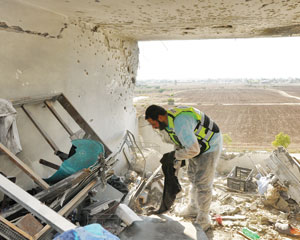 Jewish Federation of Greater Kansas City is opening a new Israel Terror Relief Fund, to stand shoulder-to-shoulder with the people of Israel at this critical time. This new fund will help support the more than 1 million residents of Israel’s south and provide aid to those who are victims and the most vulnerable Israelis during this time of conflict. One hundred percent of all donations will be used for humanitarian aid for efforts including:
Jewish Federation of Greater Kansas City is opening a new Israel Terror Relief Fund, to stand shoulder-to-shoulder with the people of Israel at this critical time. This new fund will help support the more than 1 million residents of Israel’s south and provide aid to those who are victims and the most vulnerable Israelis during this time of conflict. One hundred percent of all donations will be used for humanitarian aid for efforts including: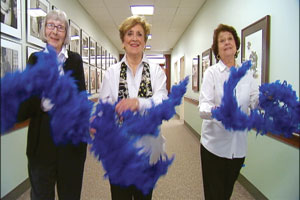 THE PLACE I CALL HOME — If you weren’t one of the 650 or so who attended Village Shalom’s Ages of Excellence celebration, honoring volunteer Evelyn Gibian, you missed a wonderful video starring Village Shalom residents, family, friends, staff and volunteers. The lyrics of “It’s Village Shalom, the Place I Call Home,” were written by the senior living campus’ Communications Manager Linda Salvay to the tune of “Bei Mir Bist Du Schoen.” Check it out at
THE PLACE I CALL HOME — If you weren’t one of the 650 or so who attended Village Shalom’s Ages of Excellence celebration, honoring volunteer Evelyn Gibian, you missed a wonderful video starring Village Shalom residents, family, friends, staff and volunteers. The lyrics of “It’s Village Shalom, the Place I Call Home,” were written by the senior living campus’ Communications Manager Linda Salvay to the tune of “Bei Mir Bist Du Schoen.” Check it out at 
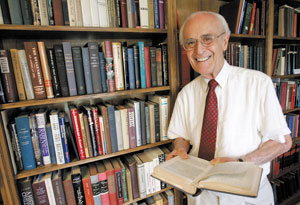 Rabbi Morris B. Margolies, who served the community as Congregation Beth Shalom’s senior rabbi for 25 years, passed away Friday evening, Nov. 9. About 600 people filled the Kehilath Israel Synagogue sanctuary on Monday to honor his life. He would have been 91 on Dec. 25.
Rabbi Morris B. Margolies, who served the community as Congregation Beth Shalom’s senior rabbi for 25 years, passed away Friday evening, Nov. 9. About 600 people filled the Kehilath Israel Synagogue sanctuary on Monday to honor his life. He would have been 91 on Dec. 25.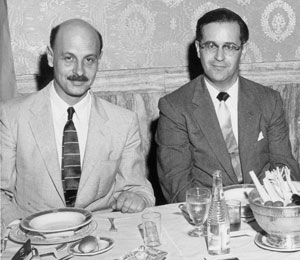 Rabbi Margolies was in good health when he retired from the pulpit in 1988, assuming the title rabbi emeritus, after 25 years, at the age of 64.
Rabbi Margolies was in good health when he retired from the pulpit in 1988, assuming the title rabbi emeritus, after 25 years, at the age of 64.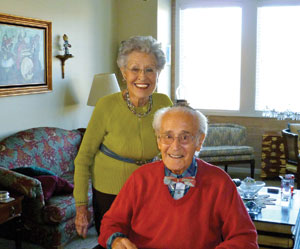 In what was to be his final interview with The Chronicle in 2008, Rabbi Morris B. Margolies told then-Chronicle Editor Rick Hellman he would like to be remembered as a scholar and a teacher. Since the Jewish community learned of his death over the past several days, he has been remembered as that, and more.
In what was to be his final interview with The Chronicle in 2008, Rabbi Morris B. Margolies told then-Chronicle Editor Rick Hellman he would like to be remembered as a scholar and a teacher. Since the Jewish community learned of his death over the past several days, he has been remembered as that, and more.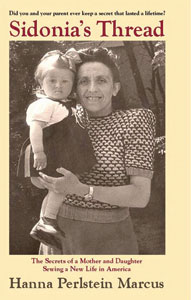 Sidonia Perlstein was the sole survivor of the Holocaust within her immediate family. In 1949 she was able to immigrate to the United States with her 2-year-old daughter Hanna. Sent to Springfield, Mass., Sidonia made a life for the two of them. Because of her talent as a gifted seamstress, within a few years Sidonia found work in a dress manufacturing factory. Hanna began school, and the process of Americanization began.
Sidonia Perlstein was the sole survivor of the Holocaust within her immediate family. In 1949 she was able to immigrate to the United States with her 2-year-old daughter Hanna. Sent to Springfield, Mass., Sidonia made a life for the two of them. Because of her talent as a gifted seamstress, within a few years Sidonia found work in a dress manufacturing factory. Hanna began school, and the process of Americanization began.